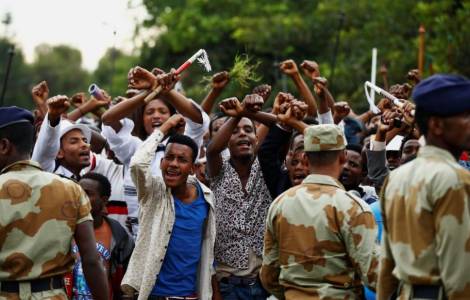
Adigrat (Agenzia Fides) - "We pray that the peace agreement is successful. It is not over yet, many of our faithful and our parishes are still besieged by foreign forces", writes Tesfaselassie Medhin, Bishop of the Catholic Eparchy of Adigrat.
According to the little news received, the war in the northern region of Tigray should subside after the signing of the peace agreement reached in South Africa between the government of Addis Ababa and the separatist organizations of the region (see Fides, 3/11/2022). "However - adds the eparch - the entire population continues to experience 'hell on earth' in this long siege and blockade of basic services that has lasted for more than two years."
The ceasefire at the beginning of November remains de facto on paper. Eritrean troops, allies of Ethiopia, are not leaving. It is the most tragic and forgotten humanitarian crisis in the world. Last month, a group of Tigray civil society organizations claimed that Eritrean forces were still killing civilians after the November agreement.
The Tigray conflict has created a security vacuum that has helped Oromo Liberation Army (OLA) rebels escalate another longstanding conflict further south in Oromia, which has become Ethiopia's most unstable region.
According to the UN aid coordination agency (OCHA), the situation is deteriorating rapidly, hundreds of thousands of civilians have been uprooted from their areas and essential services are not functioning in some areas. Oromo lawmakers from the ruling Prosperity Party in Abiy have written a letter to the Prime Minister's Office and the Speaker of Parliament, calling for a peace deal similar to the one in Tigray.
"The government has been trying to defeat the rebel group through military operations for three or four years and still hasn't found a solution", said a representative from a constituency in Oromia's East Wollega region. “That's why we need another plan. We ask for a peace agreement mediated by a third party like the African Union”.
Violence is spreading through rural areas not far from the capital, Addis Ababa, and the conflict is spreading throughout Oromia, the largest region of Ethiopia. According to a local source, more than 80,000 people have been displaced between October 15 and December 10, 2022.
The roots of this conflict go back to the late 19th century, when Oromia was conquered and absorbed by the empire of Menelik II. To consolidate his power over the area, the Ethiopian emperor introduced armed Amhara settlers to rule in his name, and many Oromo today still do not tolerate central national power well. (AP) (Agenzia Fides, 19/1/2023)